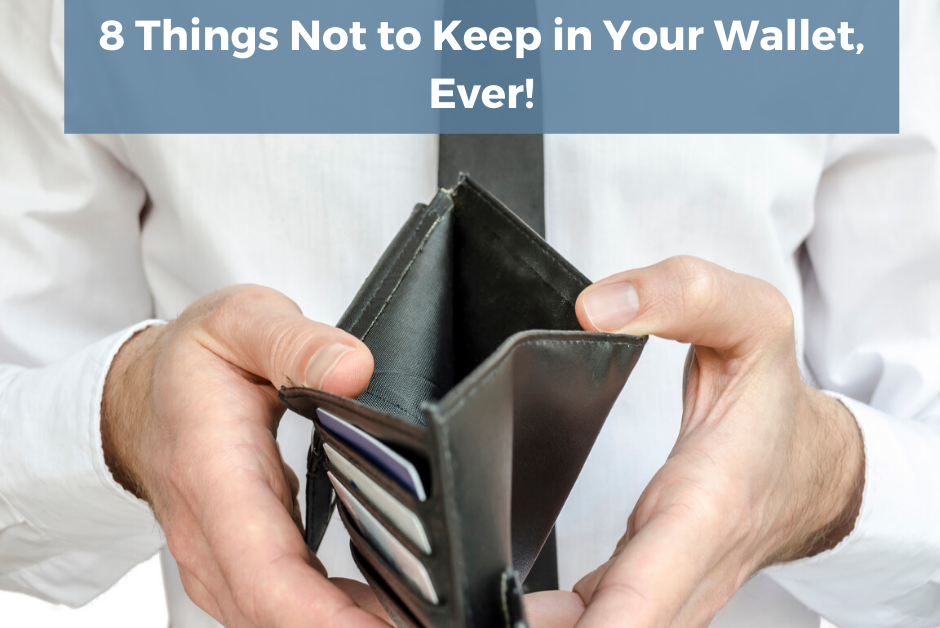Identity theft can turn your world upside down. Make yourself a tough target and never keep these items in your wallet or purse. Minimizing the chances of being a victim is your responsibility and just plain smart. Here is what the experts say about what not to keep in your wallet or purse. Think that designer handbags are more attractive to thieves? Think again when it comes to identity theft all bags are tempting.
1. Your Social Security Card
This advice to not keep your social security card in your wallet has been preached for years, but many people still choose to ignore it. Never carry your Social
The following is a listing of places Kiplinger has identified as the 10 riskiest places to give out your Social Security Number. The ranking is based on the number of data breaches involving Social Security numbers.
1. Universities and colleges
2. Banking and financial institutions
3. Hospitals
4. State governments
5. Local government
6. Federal government
7. Medical businesses (These are businesses that concentrate on services and products for the medical field, such as distributors of diabetes or dialysis supplies, medical billing services, pharmaceutical companies, etc.)
8. Non-profit organizations
9. Technology companies
10. Health insurers and medical offices
2. Password Cheat Sheet
The average American uses at least seven different passwords (and probably should use even more to avoid repeating them on multiple sites/accounts). Ideally,
3. Spare Keys
A lost wallet containing your home address (likely found on your driver’s license or other items) and a spare key is an invitation for burglars to do far more harm than just opening a credit card in your name. Don’t put your property and family at risk. (And even if your home isn’t robbed after losing a spare key, you’ll likely spend $100+ in locksmith fees to change the locks for peace of mind.) Instead, keep your spare keys with a trusted relative or friend. If you’re ever locked out, it may take a little bit longer to retrieve your backup key, but that’s a relatively minor inconvenience.
4. Checks
Blank checks are an obvious risk—an easy way for thieves to quickly withdraw money from your checking account. But even a lost check you’ve already filled out can lead to a financial loss—perhaps long after you’ve canceled and forgotten about it. With the routing and account numbers on your check, anybody could electronically
5. Passport
A government-issued photo ID such as a passport opens up a world of possibilities for an ID thief. “Thieves would love to get (hold of) this,” says Nikki Junker, a victim adviser at the Identity Theft Resource Center. “You could use it for anything”—including traveling in your name, opening bank accounts or even getting a new copy of your Social Security card. Instead, carry only your driver’s license or other personal ID while traveling inside the United States. When you’re overseas, photocopy your passport and leave the original in a hotel safe with an additional external lock you travel with like the Milockie Hotel Safe Lock.
6. Multiple Credit Cards
Although you shouldn’t ditch credit cards altogether (those who regularly carry a card tend to have higher credit scores than those who don’t), consider a lighter load. After all, the more cards you carry, the more you’ll have to cancel if your wallet is lost or stolen. We recommend carrying a maximum of two credit cards, but carrying only one is better. You might also maintain a list, someplace other than your wallet, with all the cancellation numbers for your credit cards. They are typically listed on the back of your cards, but that won’t do you much good when your wallet is nowhere to be found.
7. Medicare Card
Retired people who still carry their old card should also consider removing their Medicare card also because it has their SSN on it. Medicare has now stopped issuing medicare cards with social security numbers and has replaced the social security number with another number that can’t be used for identity fraud. Having this new card in your wallet is fine. If you still have the old-style card photocopy the Medicare card (front and back), blackout the last four digits of your SSN on the copy, and carry it with you instead of your real card, this assumes you have memorized the last four numbers of your social security number.
8. Multiple Gift Cards
Gift cards are good as cash. They are not made out to an individual and retailers don’t ask for ID when you use them. Anyone who goes through your lost or stolen wallet can take and use the gift cards as if they were cash. The smartest way to use your gift cards is to keep them at home and only take one for the store you’re going to. An additional benefit of this is that it keeps the bulk of your wallet down.
Above are the items experts recommend not to keep in your wallet or purse. One final bit of advice, photocopy the front and back of what you do carry in your wallet. So in the event your wallet is lost or stolen, you can quickly identify what is missing and then file reports with the appropriate government agencies and financial institutions.
